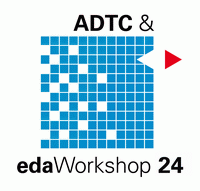New Strategies for System Design
Daniel D. Gajski, University of California at Irvine
Abstract:
With complexities of Systems-on-Chip (SOCs) rising almost daily, the design community has been searching for a new methodology that can handle given complexities with increased productivity and decreased time-to-market. The obvious solution that comes to mind is increasing levels of abstraction, or in other words, increasing the size of the basic building blocks. However, it is not clear what these basic blocks should be and what should be the strategy for creating a SOC out of these basic blocks. To make things more difficult, the difference between software and hardware is becoming indistinguishable which, in turn, requires sizable change in the industrial and academic infrastructure.
In order to find the solution, we will look first at the system gap between SW and HW designs and derive requirements for the system design flow that includes software as well as hardware. In order to enable new tools for model generation, simulation, synthesis and verification, the design flow has to be well defined with unique abstraction levels, model semantics and model transformations that correspond to design decisions made by designers. We will introduce the concept of model algebra that supports this approach and can serve as an enabler for the extreme makeover of system design and, consequently, system industry. We will support this concept with hard data and finish with a prediction and a roadmap towards the final goal of increasing productivity by several orders of magnitude while reducing expertise level needed for design of billion-transistor systems to the basic principles of design science only.
Curriculum Vitae
 Dr. Dan Gajski, a leader in the areas of embedded systems, design methodologies and languages, headed the research teams that created new design methodologies, tools and languages. He was instrumental in developing formalisms and algorithms for high-level synthesis, the definition of the finite-state-machine with data (FSMD), system level languages such as SpecCharts and SpecC, and design tools such as SpecSyn and System-on-Chip Environment. Many of these concepts have been adapted by academia and industry in the last 25 years.
Dr. Dan Gajski, a leader in the areas of embedded systems, design methodologies and languages, headed the research teams that created new design methodologies, tools and languages. He was instrumental in developing formalisms and algorithms for high-level synthesis, the definition of the finite-state-machine with data (FSMD), system level languages such as SpecCharts and SpecC, and design tools such as SpecSyn and System-on-Chip Environment. Many of these concepts have been adapted by academia and industry in the last 25 years.
Dr. Gajski directs the UCI Center for Embedded Computer Systems, with a research mission to incorporate embedded systems into automotive, communications, and medical applications. He has authored over 300 papers and numerous textbooks, including Principles of Digital Design (Englewood Cliffs, NJ: Prentice Hall, 1997) that has been translated into several languages.
He holds Dipl.-Ing. and M.S. degrees in electrical engineering from the University of Zagreb, Croatia, and a Ph.D. in computer and information sciences from the University of Pennsylvania, Philadelphia. After 10 years as Professor at University of Illinois he has joined UCI, where he presently holds The Henry Samueli Endowed Chair in Computer System Design.











